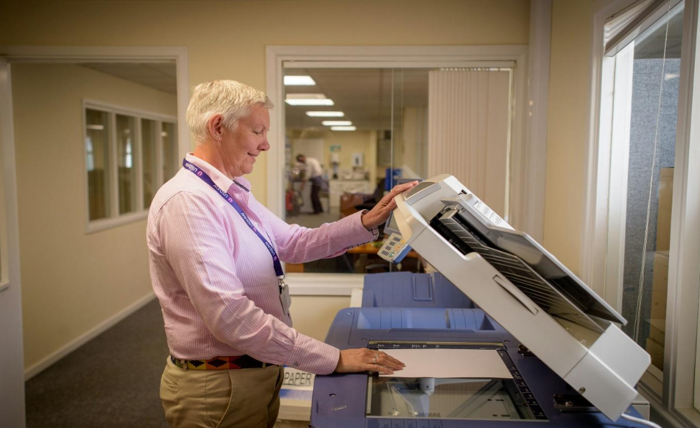
Once documents are scanned and securely stored in digital form, many people wonder whether it’s necessary to keep the originals.
The answer depends on the type of document, compliance rules, and your organization’s data retention policy.
Let’s explore how professional paperwork scanning services safely dispose of paper copies. Understanding this will help you follow compliant document retention best practices.
Should You Keep Original Paperwork After Scanning?
Scanning paperwork allows organizations to create digital copies that are easy to store, search, and share. Once converted, these files can be accessed instantly, minimizing time spent on manual searches through physical archives. This process enhances efficiency while protecting valuable records from physical damage or loss.
Many businesses and institutions now rely on digital archives as their primary record-keeping method. However, despite these advantages, the question often remains: should the paper originals still be kept?
The answer depends on the type of document, industry regulations, and the purpose of the record. Certain files, such as signed contracts, birth certificates, or court orders, may still require physical preservation for legal or historical reasons. Knowing what to retain helps balance convenience with compliance.
Understanding this distinction ensures that no critical document is discarded prematurely. Establishing clear retention guidelines allows for confident decision-making and risk reduction. Digital transformation works best when supported by strong document management policies that define which originals to keep and which can be safely disposed of.
Legal and Regulatory Considerations
Legal requirements are one of the most important factors when deciding whether to keep paper originals. Some government bodies, tax authorities, or professional regulators insist that certain records remain in their original form. Paper documents, such as notarized deeds, official licenses, or certificates, often fall under this category. In such cases, physical copies carry legal authenticity that digital versions cannot replace.
Before discarding any document, it’s essential to understand the relevant retention laws in your region or sector. For example, financial institutions and healthcare providers must adhere to strict record-keeping rules. Failure to comply can result in penalties or legal disputes. Having a legal advisor or compliance officer review policies can prevent costly mistakes.
Additionally, businesses operating in multiple jurisdictions should stay informed about international regulations. Different countries have unique standards for electronic documentation, so maintaining a consistent global policy helps ensure compliance across all operations. Paying close attention to these details safeguards both legal standing and organizational reputation.
The Benefits of Keeping Physical Copies Temporarily
Even when not legally required, holding onto paper documents for a short period can be beneficial. Temporary retention acts as a safeguard during the transition to digital storage. If a scanning error or system failure occurs, physical copies can serve as reliable backups until data integrity is confirmed. This step adds an extra layer of confidence during digital conversion projects.
Short-term retention also provides reassurance during audits or internal reviews. Original documents can be compared with digital files to verify accuracy and completeness. This process ensures that nothing was lost, misread, or misfiled during scanning. Once verification is complete, unnecessary originals can be securely disposed of to free up space.
Finally, keeping physical copies temporarily helps staff adjust to new digital workflows. Transitioning to a paperless environment often requires time and training. Maintaining originals for a limited period allows employees to gain confidence in the digital system before relying on it fully.
Deciding Which Documents to Keep Permanently
Certain documents hold long-term or irreplaceable value and should always be preserved in their original format. These may include legal contracts, signed agreements, and government-issued certificates. Archiving them in a secure, climate-controlled environment ensures they remain intact for future reference or verification. Digital copies enhance accessibility but should not replace these critical originals.
Here are some examples of documents worth retaining:
- Legal Records: Wills, property deeds, and court judgments
- Identity Documents: Birth certificates, passports, and social security records
- Financial Papers: Original loan agreements, investment certificates, and insurance policies
Preserving these records maintains legal protection and supports transparency in future disputes or claims. Even in a digital-first world, original documentation continues to serve as a definitive source of truth. A thoughtful balance between physical and digital archives provides the strongest foundation for compliance and continuity.
The Case for Going Fully Digital
For most everyday records, digital storage is sufficient and even preferable. Scanned files can be indexed, searched, and shared in seconds, saving valuable administrative time. Digital archives also support remote access, making them ideal for hybrid or distributed teams. Modern document management systems ensure that information is easily retrievable without the hassle of physical filing.
A key advantage of going digital lies in scalability. As record volumes grow, storing paper becomes increasingly inefficient. Digital systems handle large amounts of data without taking up additional physical space. Moreover, digital storage integrates seamlessly with business automation tools, supporting faster workflows and real-time updates.
However, successful digital adoption depends on accuracy and reliability. Partnering with a professional paperwork scanning service ensures that every document is captured clearly and securely. High-quality scanning eliminates readability issues and supports future-proof archiving. When handled correctly, digital files can confidently replace paper for most operational needs.
Secure Disposal of Unnecessary Paper Records
Once digital copies are verified and validated, secure disposal of the original paper is essential. Simply discarding sensitive documents in bins can expose organizations to data breaches or identity theft. Shredding, pulping, or professional destruction services should be used to ensure complete confidentiality. Proper disposal protects both the organization and the individuals whose data is stored.
Establishing a retention schedule makes this process more systematic. For example, institutions may retain paper files for six months after scanning before initiating destruction. This time frame allows for audits and quality checks while preventing unnecessary accumulation. Periodic reviews also ensure ongoing compliance with evolving regulations.
Maintaining disposal records also demonstrates accountability. Documentation of destroyed files helps confirm that all data handling procedures were followed correctly. These records serve as valuable evidence of compliance during audits or external assessments.
Ensuring Data Integrity in Digital Archives
A well-organized digital system is crucial for maintaining data accuracy. Scanned files should be stored using standardized naming conventions and folder structures. Metadata tagging can further enhance searchability and retrieval efficiency. Regular system audits and updates keep records consistent, secure, and traceable.
Data integrity also depends on reliable backup systems. Storing files on multiple platforms—such as cloud servers and external drives—minimizes the risk of loss. Encryption and password protection safeguard against unauthorized access. Periodic testing of recovery processes ensures that information can be restored quickly if needed.
Moreover, institutions should invest in staff training for digital record management. Employees must understand best practices for uploading, organizing, and securing files. A knowledgeable team strengthens system reliability and ensures long-term sustainability.
Final Remarks
Keeping original documents after scanning depends on the document type, legal requirements, and organizational policies. Some papers, like signed contracts or government records, must remain in physical form, while most everyday files can be stored digitally.
Partnering with a trusted paperwork scanning service ensures accuracy, security, and peace of mind throughout the digitization process. Start by identifying which categories of documents require permanent retention. Establish a routine for verifying digital accuracy and securely disposing of paper records once they’re confirmed. These steps promote both compliance, efficiency, and complete confidence in your digital documentation systems.




